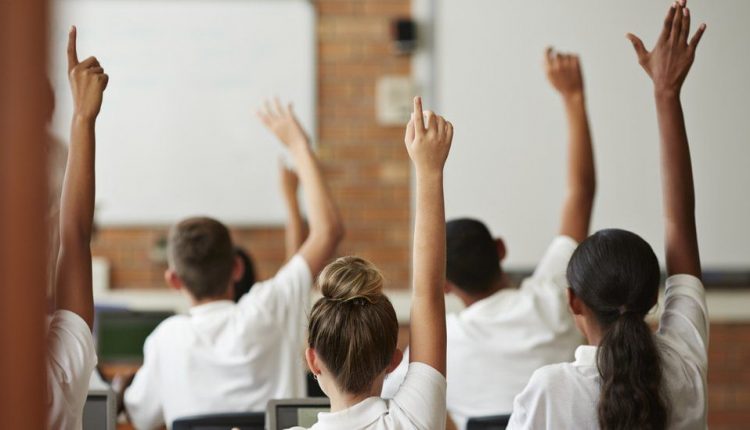Why vaccinating all teens is a difficult decision
Children are returning to school across the UK, but a decision on whether all 12-15-year-olds should be offered a vaccine against Covid is still awaited.
So what’s being debated behind the closed doors of the independent committee having the final say?
There is general agreement that this is a really tricky call to make.
Strong opinions have been expressed on all sides, by scientists, doctors and parents alike, but the JCVI (Joint Committee on Vaccination and Immunisation) is still pondering its judgement.
“Even if 100% of people in the UK were vaccinated – and their pets – the virus
would still spread.”
What we do know?
The JCVI is focusing squarely on the benefits of vaccination to children themselves – not on how it helps other people.
Children’s risk from Covid isn’t zero but the chances of them becoming seriously ill from Covid are incredibly small. Deaths among healthy children are extremely rare – most have life-limiting health conditions.
That means there needs to be a clear and obvious advantage to giving them a jab.
However, a very rare side-effect of the Pfizer and Moderna vaccines has made that calculation a lot more complicated.
Paul Hunter, professor of medicine at University of East Anglia, says there’s been intense pressure on the JCVI and he can understand why they are being cautious.
“I don’t know what the answer is – I’m very close to the fence on this. There’s not enough data to be absolutely certain.”
So what are the unknowns?
Research on millions of people who’ve had the mRNA vaccines (Pfizer and Moderna) shows there’s a tiny risk of myocarditis, or inflammation of the heart, which is more common in young people – and particularly younger boys – after a second dose. It can cause chest pain and a pounding heart, but symptoms usually clear up in days.
No vaccine or drug is ever 100% safe, and data from the US shows the numbers of children affected are very small.
For every million Pfizer doses given to 12-17-year-old-boys, around 60 had the condition (compared with 8 in a million among girls). The rates in this age group are higher than in older ones – and it’s why only one dose for 16 and 17-year-olds in the UK has been recommended, for now.
But being infected with Covid has consequences for teenagers’ health too – including their hearts – so how big is that risk?
“A key unknown is the risk of myocarditis from Covid infection itself,” says Prof Neil Ferguson, a former government adviser, from Imperial College London.
“If it’s similar or higher than from vaccination, then vaccination is more likely to be beneficial.” But he says it’s “not possible” to give a definitive answer now.
- Which children are being vaccinated and why?
- NHS England prepares jabs plan for 12-15-year-olds
- Third Covid jab advised for most vulnerable 1%
What’s happening elsewhere?
The US is pushing ahead and has vaccinated more than 10 million 12-15 year olds, confident that the serious complications of Covid-19 are a much greater risk than vaccines. France, Italy, Canada, Israel and Ireland are also doing the same.
Prof Christina Pagel, from University College London, believes the case for vaccinating three million younger teens in the UK is “overwhelming” because it would protect them against the immediate and long-term impacts of Covid, as well as reduce infections in schools.
She points to a recent US study which suggests that having Covid-19 could be six times more likely to trigger myocarditis in young men than the vaccine, with a rate of about 450 per million infections.
But the JCVI’s caution may mean it’s not persuaded by the data it has seen to date. The last thing it wants is to give the go-ahead and then for a series of adverse events to dent parents’ confidence in other childhood vaccines.
And the UK has gone its own way before, on the decision to extend the gap between doses, which proved to be spot-on.
What would jabbing children achieve?
Vaccinating secondary school-age children wouldn’t stop the virus circulating in schools or in society more generally.
“Even if 100% of people in the UK were vaccinated – and their pets – the virus would still spread,” Prof Hunter says.
But vaccines for teens are still likely to reduce infections in that age group, and could help keep more children in school over winter, although it’s unclear how much it would limit wider community spread.
The government’s scientific advisers recently said that 40-70% of children in secondary schools may already have been infected by the start of term, meaning many have some in-built protection.
Taking a broader view of the benefits of vaccinating children might shift the decision of the JCVI, “but that’s a very difficult judgement”, Prof Calum Semple, from the University of Liverpool, has said.
Then there’s the question of whether encouraging more over-18s to have a vaccine would be a more productive aim, given their greater risk, with more than 12% still reluctant to even have one?
It might be, but that’s not the JCVI’s focus. In the end it comes down to a fine balance between a very rare side-effect from the vaccine, and a very low risk to children themselves from Covid.


Comments are closed.